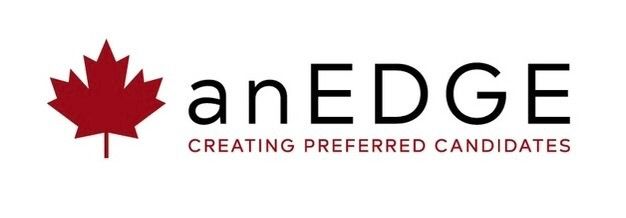Every year, thousands of Canadians begin the Royal Canadian Mounted Police (RCMP) hiring process. Many make it through the early eligibility steps — but stumble when they reach the RCMP entrance assessment.
The reason? Most underestimate how strategic and skill-based the test really is.
At anEDGE, we help Canadian law-enforcement applicants master every step of their journey, from the RCMP entrance exam to interview coaching. Our 1-on-1 programs, built by former RCMP recruiters and HR specialists, are designed to prepare you for the real thing — not just another practice test.
In this article, we break down the five biggest RCMP entrance assessment mistakes — and show you exactly how to avoid them.
Mistake #1: Treating It Like a Basic Quiz
Many applicants think the RCMP entrance assessment simply tests general knowledge. In reality, it measures cognitive skills, situational judgement, and behavioural reasoning — all under timed pressure.
Why It Hurts:
- Without structured preparation, candidates freeze under pressure or second-guess simple questions.
How to Avoid It:
- Learn what each section measures (verbal, numerical, reasoning, judgement).
- Practise under timed exam conditions.
- Focus on question patterns, not random trivia.
Pro tip: anEDGE’s RCMP Entrance Assessment Practice Exams mirror the real test — same timing, same structure.
Mistake #2: Ignoring Time Management
The RCMP exam rewards both accuracy and efficiency. Candidates who take too long on early questions often leave half the test unfinished.
Why It Hurts:
- Even a handful of unanswered questions can drop your score below the qualifying range.
How to Avoid It:
- Skim every question first; mark hard ones for review.
- Spend no more than 45–60 seconds per question initially.
- Use easy questions to bank time for tougher ones later.
Mistake #3: Practising Without a Plan
Many candidates do a few sample tests online, but don’t track progress or target their weaknesses.
Why It Hurts:
- Random practice builds familiarity — not improvement.
How to Avoid It:
- Take one baseline test to identify weak areas (numerical, spatial, verbal, etc.).
- Create a weekly schedule focusing 60% on weaker skills and 40% on maintaining strengths.
- Re-test weekly under timed conditions.
Remember: Consistent, structured practice consistently outperforms marathon cramming the night before.
Mistake #4: Overlooking Situational Judgement Sections
The situational judgment test (SJT) portion catches many off guard. It measures how you’d handle realistic RCMP scenarios, including conflict, teamwork, and ethics.
Why It Hurts:
- Candidates often rely on “common sense” answers that don’t match RCMP values or priorities.
How to Avoid It:
- Learn how the RCMP defines professionalism, integrity, and teamwork.
- Practise SJT questions and compare your choices to recruiter-approved responses.
- Ask yourself, “What response best reflects RCMP values — fairness, composure, and accountability?”
Mistake #5: Skipping Professional Feedback
Practicing alone helps, but without external feedback, you can’t identify subtle timing issues, weak phrasing, or poor reasoning patterns.
Why It Hurts:
- You may repeat the same mistakes and plateau before test day.
How to Avoid It:
- Work with a professional coach or recruiter-trained instructor.
- Take a timed mock exam and review results line by line.
- Use structured feedback to refine both skill and confidence.
At anEDGE, our former RCMP recruiters guide candidates through full mock assessments, timed simulations, and post-test reviews — helping you turn weaknesses into strengths.
Checklist: Avoiding Common RCMP Entrance Assessment Mistakes
- I’ve completed at least one full timed simulation.
- I can finish most sections within the time limit.
- I know my weakest area and have improved it.
- I understand the RCMP’s values and situational approach.
- I’ve received professional feedback from a coach or mentor.
If you can’t tick all of these boxes, we can help you get there.
At anEDGE, we don’t just give you practice tests — we teach you how to think like an RCMP recruiter.
Our RCMP Entrance Assessment Practice Exams and 1-on-1 coaching programs include:
- Authentic exam-style questions updated for 2025–2026
- Full timed simulations with score tracking
- One-on-one analysis sessions with former RCMP recruiters
- Strategies to improve time-management, accuracy, and confidence
Real Police. Real Coaching. Real Results.
FAQs
Q1: Is the RCMP entrance assessment hard? A: It’s challenging, but with structured preparation and realistic practice, most applicants can improve dramatically.
Q2: How long does the test take? A: While official times can vary, you should expect the assessment to take approximately 60–90 minutes to complete.
Q3: Can I use a calculator or scratch paper? A: You cannot use your own calculator or scratch paper. However, an on-screen calculator or digital notepad may be provided for specific sections. You should be prepared to perform simple calculations without aids.
Q4: How often can I retake the RCMP assessment? A: If unsuccessful, you must usually wait a set period before re-testing. Check the official RCMP recruiting site for the latest policy.
Q5: Where can I find authentic practice tests? A: anEDGE offers fully updated RCMP practice exams and coaching built by former recruiters.
Explore our practice exam page
Conclusion: Avoid these top RCMP Entrance Assessment Mistakes.
Avoiding these five RCMP entrance assessment mistakes can dramatically improve your score. Preparation isn’t just about memorizing — it’s about building the mindset, timing, and reasoning skills recruiters look for.
With focused practice and expert feedback from anEDGE, you’ll be ready to take the next step in your RCMP career with confidence.
Visit our RCMP Entrance Assessment Practice Exams page to start today.
